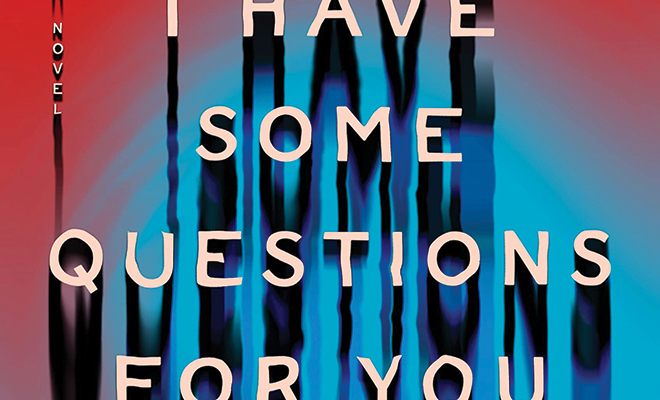
I Have Some Questions for You by Rebecca Makkai
In the mystery novel I Have Some Questions for You by Rebecca Makkai, Brodie Kane has achieved success as a film professor and podcaster since her boarding school days at Granby School in the woods of New Hampshire. Twenty-three years later, Brodie is invited back to Granby to teach a summer mini course on podcasts. Brodie’s podcasts are about Hollywood starlets who suffered sexual harassment prior to the #Metoo movement
During her senior year at Granby, Brodie’s former roommate, Thalia Keith, was murdered. The police investigated and the district attorney convicted Omar Evans, a black athletic trainer, for Thalia’s murder on flimsy evidence.
Over the years, Brodie, with 20/20 hindsight, becomes convinced that one of her teachers, not Omar, was the real murderer. Throughout the novel, in referring to “you,” Brodie is referring to her music teacher, Denny Bloch. Brodie assisted Bloch with tech functions and stage management during the production of Camelot, in which Thalia was starring. Brodie saw many suspicious scenes between Thalia and Bloch from the back of the theater and on a school outing to New York City to study opera. She is now convinced that Bloch was grooming Thalia for his perverse needs. Bloch left for Bulgaria shortly after the school year finished, and Brodie believes this is prima facie evidence that he was guilty. No one knows where he is living now.
Still, as a professional podcaster, Brodie is aware of libel laws and wary of accusing anyone without evidence so she keeps her beliefs mainly to herself, confiding only in her friend Fran from Granby days and her husband, from whom she is separated.
Thalia had a boyfriend, Robbie Serenho, an entitled jock on the school ski team. More than one classmate believed he abused Thalia during their relationship. Now, Robbie is a respectable businessman, husband and father of two children. Could he have murdered Thalia in a fit of rage decades ago? Brodie doesn’t think so; Robbie had an ironclad alibi. He was at the mattresses the students used for drinking parties.
Brodie allows her students to choose their project for the podcast course; one student, Britt, decides to investigate Thalia’s murder. Though she is hesitant about the student’s choice, Brodie decides to let Britt go ahead with her proposal. Brodie has never been satisfied with Omar’s sentencing for Thalia’s death. She has always believed that Bloch did it, but she has absolutely no proof. So, she decides to let Britt investigate the case as a school project. After all, what evidence can she find after so long?
Many people who were on campus at the time of Thalia’s death prefer to let sleeping dogs lie; they don’t want to recall their boarding school days. Boarding school was a time of misery for many students. The boys were teenage jocks or misfits and the girls were either part of the in crowd or outliers like Brodie. Others feel bad that Omar might have been convicted for a crime he didn’t commit. The police investigation was perfunctory at best. About two-thirds of the way through the novel, Brodie realizes that the murder scene may not have been the swimming pool after all, but rather a small storage area nearby. Suddenly, the novel begins to take off.
Rebecca Makkai’s fourth novel, I Have Some Questions for You is dark and unsettling. It is slow, plodding and boring for the most part. The literary murder mystery is hardly a vehicle for all the subplots that Makkai introduces: the #MeToo movement, society’s callousness toward abused and murdered women, racism, social classes, sexual predators in education, assessment of social media and collective memory. Her feminist viewpoints on the different subplots are interesting, and while the reader may agree with her, Makkai’s sanctimonious diatribes are tedious at best.
This is not an old-fashioned murder mystery with a crime, investigation, solution and justice for the victims. By the end of the novel, the reader knows who the guilty party is, but Makkai does not give the reader a satisfactory resolution to the story. She leaves them hanging. It seems that Makkai preferred to show her expertise as an experimental literary novelist and social activist rather than tell the tale.
Rebecca Makkai is a young American author whose work is well worth following. She is a talented writer and her prose is beautiful. Her third novel, The Great Believers, was a finalist for the Pulitzer Prize and the National Book Award. It was awarded the ALA Carnegie Medal and the LA Times Book Prize. Unfortunately, this book does not live up to those standards. Even so, she has something to say and says it beautifully and intelligently. While this novel fell short of its promise in many ways, it will be exciting to see what Makkai tackles next.







